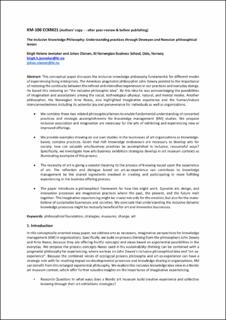| dc.description.abstract | This conceptual paper discusses the inclusive knowledge philosophy fundamental for different modes of experiencing living enterprises. The American pragmatist philosopher John Dewey pointed to the importance of restoring the continuity between the refined and intensified experiences in our practices and everyday doings. He based this restoring on “the inclusive philosophic idea”. By this idea he was acknowledging the possibilities of imagination and associations among the social, technological-physical, natural, and mental modes. Another philosopher, the Norwegian Arne Naess, also highlighted imaginative experience and the human/nature interconnectedness including its potential joy and perseverance for individuals as well as organizations. • We combine these two related philosophical lenses to enable fundamental understanding of concerted practices and strategic accomplishments for knowledge management (KM) studies. We propose inclusive association and imagination are necessary for the arts of exhibiting and experiencing new or improved offerings. • We provide examples drawing on our own studies in the businesses of art organizations as knowledge-based, complex practices. Given that rich knowledge endeavours are necessary to develop arts for society, how can valuable arts/business practices be accomplished in inclusive, resourceful ways? Specifically, we investigate how arts business exhibition strategies develop in art museum contexts as illuminating examples of this process. • The necessity of art is giving a societal meaning to the process of knowing based upon the experience of art. The reflection and dialogue based on art-as-experience can contribute to knowledge management by the shared ingredients involved in creating and participating in more fulfilling experiencing in the business offering process. • The paper introduces a philosophical framework for how this might work. Dynamic art, design, and innovation processes are imaginative practices where the past, the present, and the future melt together. The imaginative experiencing might be crucial not only for the creation, but also for the make-believe of sustainable businesses and societies. We conclude that understanding the inclusive dynamic knowledge processes might be mutually beneficial for art and innovative businesses. | en_US |
